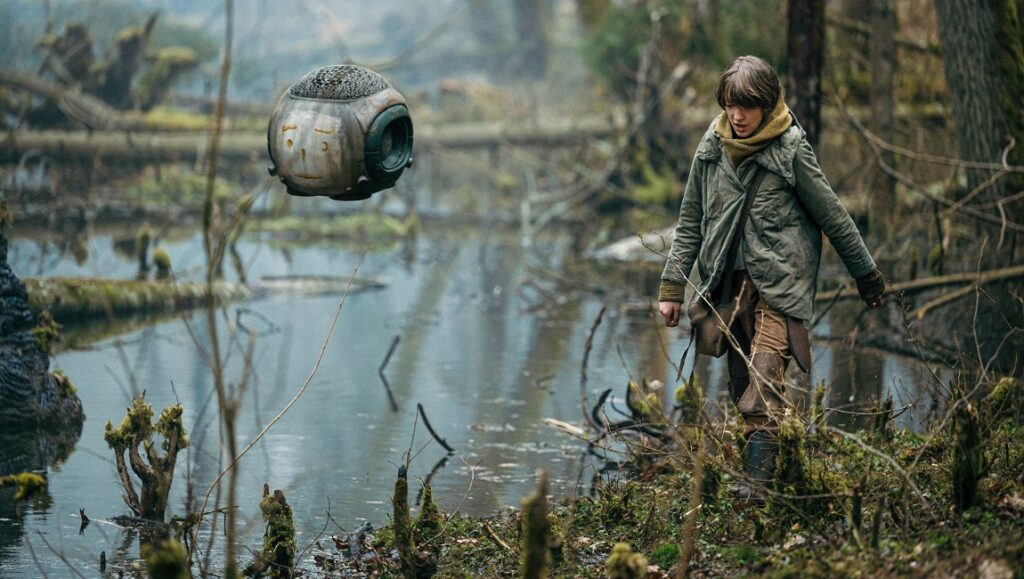Vesper is undeniably indebted to a long lineage of sci-fi antecedents, but its peculiar character and keen visual style keeps this a cut above your typical genre fare.
We’ve written before about the long shadow cast by The Walking Dead over the last decade or so of pop culture. And while that lumbering, one-time ratings juggernaut finally shuffles off the air later this year (nothing lives forever after all), our collective fascination with graphic depictions of various potential dystopian futures carries on unabated. While the zeitgeist has moved on to germs and viruses instead of the undead as its metaphor du jour (see also HBO’s remarkable Station Eleven), dour visions of a ravaged future humanity struggling for survival somehow still possess the power to captivate. We’ve now reached a point where waves of pandemic productions are finally being released at a steady clip, projects either conceived of before Covid and rendered prescient by association or projects created specifically during or immediately after lockdowns. It’s the same old story — there’s a brave new world out there, and we should be terrified of everything in it.
All of which is a roundabout way of saying that the new indie sci-fi oddity Vesper has a lot of ideas that you’ve seen before, which nonetheless are so carefully rendered here in a small-scale, affecting milieu that it’s all the more unsettling because of how plausible it feels. An opening scrawl informs us that sometime in the future scientists attempted to avert global catastrophe by genetically engineering seeds and plants. But the experiments escaped into the wild, infecting the world and killing off or otherwise infecting all the natural flora and fauna. In the ashes of this catastrophe, parts of society gathered into walled-off citadels while others were left to fend for themselves in a land rendered strange and hostile. It’s another tale of the haves and the have-nots, an exaggerated extrapolation of our own very real and current economic predicament.
13-year-old Vesper (Raffiella Chapman) is introduced scrounging for food in a desolate patch of muddy ground, ominous machinery filling the sky behind her. She’s accompanied at all times by a talkative drone, revealed in due course to house the consciousness of her invalid father, Darius (Richard Brake). Vesper cares for his crumpled body, which is bedridden and hooked up to a multitude of bio-mechanical gadgets that both feed him nutrients and allow his voice to communicate through the drone. Desperate for food, Vesper visits an encampment run by Jonas (Eddie Marsan), who trades proteins for blood, which he in turn trades to the denizens of the Citadels for bio-engineered seeds. Marsan makes for a distressingly human villain, a man who has carved out a tiny fiefdom for himself and who will do anything to protect it. He also wants to continue propagating the species, a euphemism for keeping a stable of fertile young women who will bear him children. It’s despicable stuff, all the more so for how mundane this man’s desires are. More pressing is the Citadel’s insistence that seeds be genetically modified to last for only one season, necessitating a new purchase or barter every year if the people on the outside wish to grow a new harvest. Into all this strife comes Camellia (Rosy McEwen), a Citadel resident who crashes with her father into the wastelands when their private transport malfunctions. Vesper stumbles across her in the woods, removing her body from a tangle of intrusive plants with tendril-like roots that have begun growing under Camellia’s skin. Vesper cares for her wounds and decides that Camellia is her and her father’s ticket away from Jonas and into the safety and luxury of the Citadel.
The plot spirals out from there, as Vesper and Camellia forge a tentative friendship, fend off Jonas’ increasingly violent entreaties, and hatch a plan to gain entry to the promised land. But Vesper is keeping a secret — Camellia’s father is dead — while Camellia has a secret of her own. Most interesting is directors Kristina Buozyte and Bruno Samper’s fascination with a kind of Cronenberg-esque body horror that creeps into the margins of the film, a conflation of the mechanical and biological into a disturbing mess of viscous bodily fluids and weird organic machines. Trees in the forest pulsate as if they have heartbeats, and cutting them open reveals guts. When Vesper goes to open the drone that houses Darius’ voice, the metal access hatch leads to a fleshy vaginal canal, which she works on like a gynecologist. In her free time, Vesper attempts to engineer plants and crack the code that the Citadel uses to copyright their seeds, but manages to create aggressive flowers that merge and meld and attack each other in odd ways. There’s also the matter of “jugs,” engineered humanoids that are used as labor and treated as second-class citizens by inhabitants of the citadels and the wastelands. It’s a heady mix of sci-fi conceits, realized by cinematographer Feliksas Abrukauskas in muted earth tones and gray, overcast skies (the film was shot in Buozyte and Samper’s native Lithuania). There’s no denying the load of antecedents here, from Blade Runner to more recent stuff like Moon, Annihilation, Prospect, and Raised by Wolves, but some fine performances and a keen and peculiar visual sense keep Vesper a cut above your typical streaming flotsam.


Comments are closed.